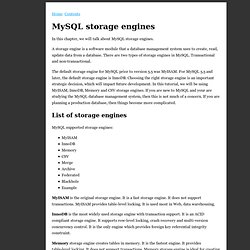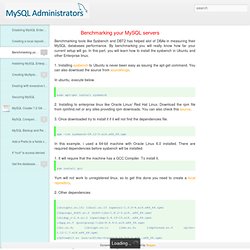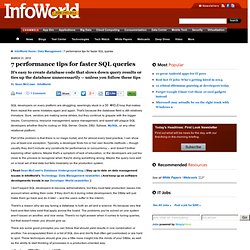

MySQL 5.5 Reference Manual. Microsoft Word - InnoDB_MyISAM_Benchmarks.doc - Wp_MySQL-5.5_InnoDB-MyISAM.en_.pdf. [MySQL] Jakie są różnice między MyISAM a InnoDB? Jakiś czas temu, podczas projektowania aplikacji internetowej, zacząłem się zastanawiać – jakie są różnice pomiędzy MyISAM a InnoDB?
![[MySQL] Jakie są różnice między MyISAM a InnoDB?](http://cdn.pearltrees.com/s/pic/th/myisam-webmasterski-tutoriale-77218449)
Który mechanizm składowania danych wybrać, aby było wszystko ok? Tak powstał pomysł na ten artykuł. Postaram się w nim przybliżyć specyfikę obydwu systemów i spróbuję Ci wskazać ten lepszy. Różnice w możliwościach i działaniu InnoDB jest nowszym rozwiązaniem niż MyISAMInnoDB jest bardziej rozbudowany a MyISAM jest prostszyInnoDB bardziej dba o integralność danych niż MyISAMInnoDB stosuje blokadę poszczególnych wierszy na czas edycji i aktualizacji danych w bazie, podczas gdy MyISAM stosuje blokadę całej tabeli (w skrócie – na czas operacji w InnoDB tylko wiersze są niedostępne, a w MyISAM cała tabela)InnoDB posiada system transakcyjny, a MyISAM nieInnoDB pozwala na korzystanie z kluczy obcych, a MyISAM nieInnoDB lepiej radzi sobie z odzyskiwaniem danych po ewentualnych crashachMyISAM ma pełnotekstowy indeks wyszukiwania Zalety InnoDB Wady InnoDB Zalety MyISAM. MySQL storage engines. HomeContents In this chapter, we will talk about MySQL storage engines.

A storage engine is a software module that a database management system uses to create, read, update data from a database. There are two types of storage engines in MySQL. Transactional and non-transactional. The default storage engine for MySQL prior to version 5.5 was MyISAM. List of storage engines MySQL supported storage engines: MyISAMInnoDBMemoryCSVMergeArchiveFederatedBlackholeExample MyISAM is the original storage engine. InnoDB is the most widely used storage engine with transaction support. Memory storage engine creates tables in memory. CSV stores data in csv files. Merge operates on underlying MyISAM tables. Archive storage engine is optimized for high speed inserting. The Blackhole storage engine accepts but does not store data. Federated storage engine offers the ability to separate MySQL servers to create one logical database from many physical servers.
Choosing the right engine. Benchmarking your MySQL servers. Benchmarking tools like Sysbench and DBT2 has helped alot of DBAs in measuring their MySQL databases performance.

By benchmarking you will really know how far your current setup will go. In this part, you will learn how to install the sysbench in Ubuntu and other Enterprise linux. 1. Installing sysbench to Ubuntu is never been easy as issuing the apt-get command. You can also download the source from sourceforge. In ubuntu, execute below. sudo apt-get install sysbench. 10 sql tips to speed up your database. Design your database with caution This first tip may seems obvious, but the fact is that most database problems come from badly-designed table structure.

For example, I have seen people storing information such as client info and payment info in the same database column. For both the database system and developers who will have to work on it, this is not a good thing. When creating a database, always put information on various tables, use clear naming standards and make use of primary keys.Source: Know what you should optimize If you want to optimize a specific query, it is extremely useful to be able to get an in-depth look at the result of a query. EXPLAIN SELECT * FROM ref_table,other_table WHERE ref_table.key_column=other_table.column; Source: The fastest query… Is the one you don’t send Each time you’re sending a query to the database, you’re using a bit of your server resources.
There’s lots of solutions to implement a query cache on your server. Don’t select what you don’t need Source: 1 Reference Manual. 7 performance tips for faster SQL queries. SQL developers on every platform are struggling, seemingly stuck in a DO WHILE loop that makes them repeat the same mistakes again and again.

That's because the database field is still relatively immature. Sure, vendors are making some strides, but they continue to grapple with the bigger issues. Concurrency, resource management, space management, and speed still plague SQL developers whether they're coding on SQL Server, Oracle, DB2, Sybase, MySQL, or any other relational platform. Part of the problem is that there is no magic bullet, and for almost every best practice, I can show you at least one exception. Typically, a developer finds his or her own favorite methods -- though usually they don't include any constructs for performance or concurrency -- and doesn't bother exploring other options. I don't expect SQL developers to become administrators, but they must take production issues into account when writing their code.